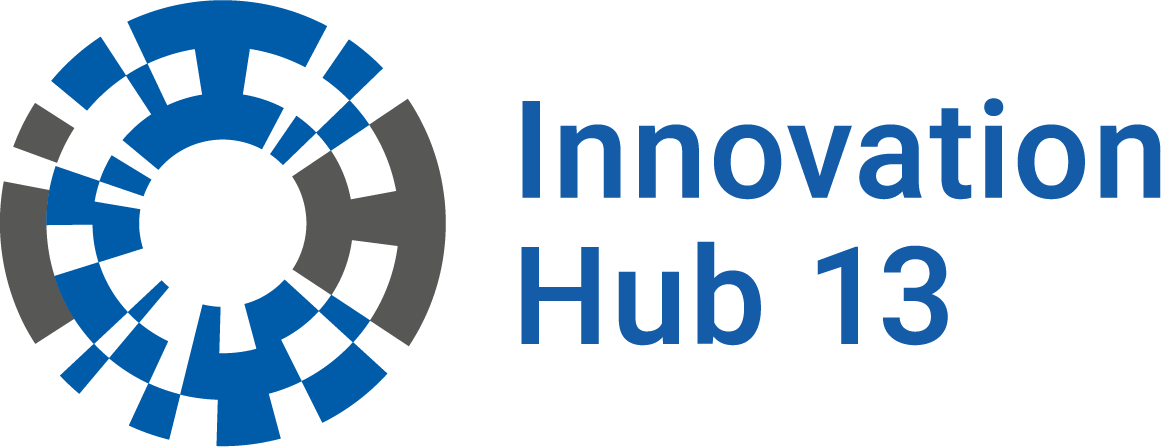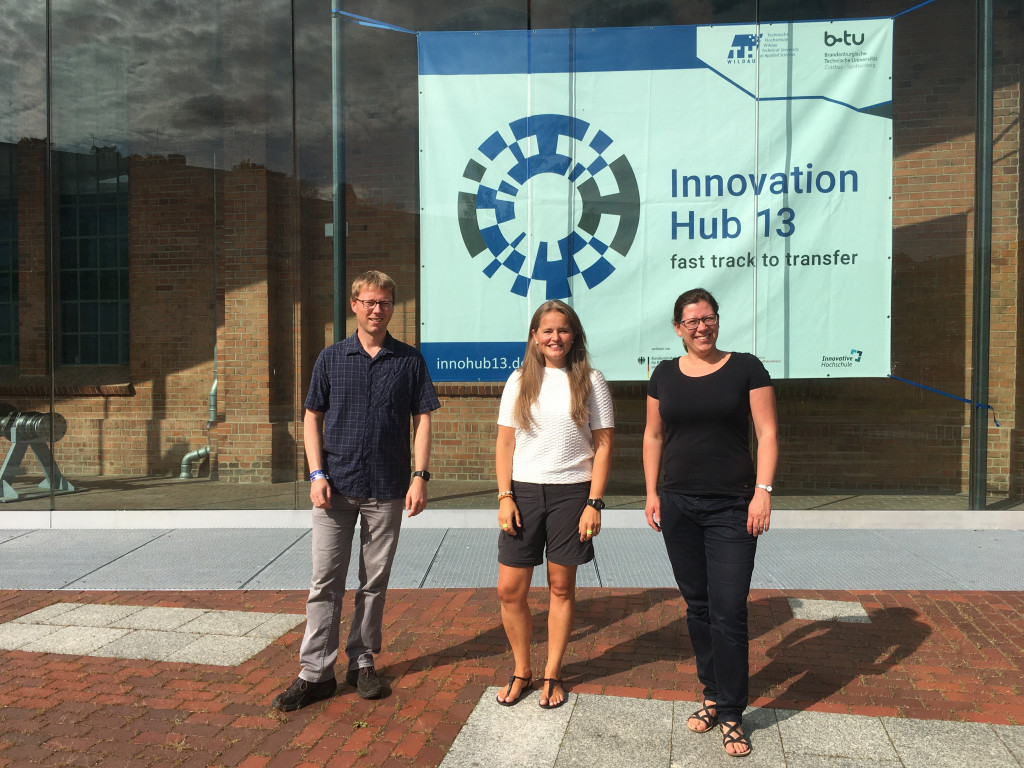

Baltic Sea Region Cluster Management Education: „Scouting for Innovation“
From August 30th to September 1st, Technical University of Applied Sciences Wildau (TH Wildau) was hosting the last of in total four modules of a joint project called „Baltic Sea Region Cluster Management Education“. The programme started in September 2020 and aims at identifying and fostering innovation and collaboration across various institutions of the littoral states of the Baltic Sea region. The key topic at Wildau was the issue of „Scouting for Innovation“.
Photo: Carsten Hille (l.) and Sarah Schneider (r.) from Technical University of Applied Sciences Wildau (TH Wildau) with Triinu Varblane (m.) from the Finnish Technology Centre Merinova at TH Wildau’s campus in August 2021.
© TH Wildau, Leberecht
In the last decade, the term innovation has been ubiquitously used by companies, institutions and politics in the search for both progressive and at the same time meaningful resolutions in business, technology and society. But how can innovation be identified? How can it be successfully monitored, grasped and brought to companies and people? How can it be made tangible and best scouted?
Partner institutions from Finland, Sweden and Lithuania
These questions were addressed and discussed in the module „Scouting for Innovation“ hosted by TH Wildau in late August 2021 with cluster participants coming from countries bordering the Baltic Sea, for example Sweden, Finland, Lithuania, Estonia, Denmark, Poland, Latvia and Germany. „Cluster Management is a highly demanding work which requires a set of good skills, ranging from strategy preparation skills to human resource management, and skills needed to implement this into an internationalization strategy. Today, there is no clear definition of the job assignment as a Cluster Manager, and therefore no defined prior education for this work category. Thus, the programme is unique in its kind in the Baltic Sea region and even on European level,“ says Triinu Varblane, International Business Developer at the Technology Centre Merinova in Finland, one of the organisers behind the education programme.
The programme Baltic Sea Region Cluster Management Education itself was launched in fall 2019 with the first two modules „Collaboration and Leadership“ and „Strategic Management and International Business Environment“ taking place in late 2020 followed by the third module „Digitalisation in Business“ in 2021. Due to the Coronavirus pandemic, all sessions were held remotely. The main objective of the Baltic Sea Region Cluster Management Education is to develop and pilot a one-year cross-border Cluster Manager Education with ECVET-validation (European Credit System for Vocational Education and Training). The partners involved are a team of cluster organisations and universities consisting of the global learning provider Hyper Island in Sweden, the University of Vaasa in Finland, Kaunas University of Technology in Lithuania and TH Wildau.
Carsten Hille from TH Wildau, transfer scout life sciences and together with Sarah Schneider from TH Wildau one of the participants, says: „We as programme participants, whether from Germany, Finland, Sweden, Lithuania or other countries bordering the Baltic Sea, share similar challenges. How do we talk to the cluster members? How we can activate them in order to advance successful cooperation? And what tools, especially given the increasing digitalisation during the Coronavirus pandemic, are adequate, easy or hard to use for cluster members for developing internationality and cluster management in theory and in practice?“
Workshop „Scouting for Innovation“ presents transfer scouting methodologies
The module “Scouting for Innovation“ at TH Wildau was in particular designed to enable institutions and companies to deal better with uncertainties and potential changes. The module delivered an overview of different scouting approaches and emphasizes methods that can be implemented in different scouting settings. The presented methodological approaches, for example transfer and technology radars, technology boards, signal scanning, expert interviews, delphi or scenario approaches, have the potential to support transfer processes between different actors in a selected region or cluster by creating awareness and a crucial knowledge base. „These tools allow an interested community a fast screening of interest areas. They bring together topics of research, innovation scouting, and direct implementation of educational, economic and technical settings,“ says Sarah Schneider from TH Wildau, project coordinator of the Innovation Hub 13.
The main goal of the fourth module was, after successful completion and attendance, that participants are expected to have the competence to detect and assess trends in the respective field of technology deriving from scouting processes. „In the future,“ says Triinu, „the characteristics for a successful educator and innovator to have are foremost flexibility, open-mindedness, and curiosity: towards people, tools, towards the analogue and the digital, and towards new strategies and innovation.“
Or as the Austrian economist Joseph Schumpeter coined it in the early 20th century: „An innovation is the successful implementation of technical or organizational novelties, it is not only their discovery.“ This also holds true for the Baltic Sea Region Cluster Management Education in 2020/21 with both detecting and implementing innovation in the relatively new area of Cluster Management.
Please find here more information on the programme Cluster Management Education: https://www.clustereducation.com
Disclaimer
The European Commission’s and Swedish Institutes support for the production of this publication does not constitute an endorsement of the contents, which reflect the views only of the authors, and neither the Commission nor the Swedish Institute can be held responsible for any use which may be made of the information contained therein.
Do you have questions, suggestions, ideas or specific projects? We are looking forward to talking to you!
Technical University of Applied Sciences Wildau
Brandenburg Technical University Cottbus-Senftenberg
The "Innovation Hub 13 - Fast Track to Transfer" of the Technical University of Wildau and the Brandenburg Technical University of Cottbus-Senftenberg is one of the 29 selected winners of the federal government funding initiative "Innovative College", equipped with funds of the Federal Ministry of Education and Research BMBF And the state of Brandenburg. Further information can be found at www.innovative-hochschule.de




